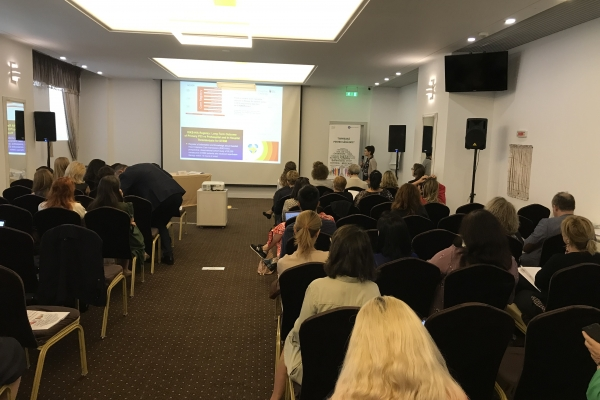On September 11, 2019 it was launched the "European Public Health Challenges" Programme financed within EEA Financial Mechanism 2014-2021 in the presence of Mr. Secretary of State Dan Dumitrescu, Ministry of Health, of Mrs. Secretary of State Ana Maria Buşoniu, Ministry of European Funds, of Mrs. Grete Kristine Ødegaard, Embassy of the Kingdom of Norway in Romania and of Norwegian partners at program level, the Norwegian Institute of Public Health and the Norwegian Directorate of Health.
Other participants to this event were the representatives of the project promoters, representatives of the ministries involved in the development of the programme, representatives of public health institutions and non-governmental organizations, representatives of the mass-media.
The Programme objectives are to improve prevention and to reduce inequalities in health by supporting a high range of measures, among which: prevention and treatment of communicable diseases, improving the health status of vulnerable groups (children, elderly, Roma) by setting up new services of primary health care and community care assistance, improving the access to prevention services in child and woman health, nutrition, pediatric oncology, mental health for children, cervical cancer screening, medical and diseases registries and measures to control hospital infections and reduce antibiotics consumption.
Implemented in partnership with Norwegian Institute of Public Health and Norwegian Directorate of Health, the European Public Health Challenges Programme has a total allocation of 47.058.824 euro (including 15% national co-financing).
The main estimated results of the programme are:
- 2 studies on health status of Romanian population based on EU methodology (EHES), one for adults and one for children developed;
- 84 fully equipped and functional community integrated centres;
- 45 newly created school cabinets fully functional;
- 200 family doctors cabinets using PREVENT application achieved;
- 1 good practices model for community healthcare developed;
- 7,000 preventive cancer screening tests performed to women from vulnerable groups of 7 counties;
- 1500 women treated with mobile unit or in ambulatory care achieved;
- 30000 women informed on cervical cancer prevention by door to door campaign accomplished;
- 1 health professional registry developed and functional;
- early detection of heart failure due to ischemic heart disease increased with 40%;
- 1 Medical Registry to track left ventricular remodelling as a result of acute myocardial infarction developed and functional;
- 2000 patients with heart failure receiving support and proper treatment done;
- 35 community care centres established and functional;
- 48000 vulnerable persons that have received health preventive services (primary and community care assistance) accomplished;
- Tuberculosis mortality rate (per 100,000 population) decrease to 4% done;
- 15300 persons tested for tuberculosis done;
- 600 M/XDR tuberculosis patients receiving adequate social and psychological treatment and support done;
- Increasing the cured cases in paediatric oncology from 60% to 70% done;
- 450 children per year receiving diagnostic and treatment in paediatric oncology done;
- 1 health policy adapted to the needs in mental health area done;
- 3000 children at risk to have a mental health disease and children with mental health diseases receiving community health services for complex evaluation, early intervention, diagnostic and treatment done;
- 8 standards for mental health community services developed and implemented
- 1500 parents better informed with regards to main risks of developing mental health disorders and positive parenting as one of the main protective factor against it done;
- National strategy and action plan for hospital acquire infection and antibiotics consumption developed and piloted;
- Guidelines for antimicrobial infection management developed;
- 170 of health professionals trained in preventing, surveillance and control of hospital acquire infection and antibiotics consumption management done;
- 4000 vulnerable persons that have received health care services done;
- 10 bilateral initiatives in Romania or EEA countries for strengthening bilateral cooperation, exchange of good practices, know-how in health area accomplished;
- Investment in equipment, refurbishment of buildings;
- Information, education and awareness campaigns form health professionals and other professionals, legislative proposal for improving legislation in force;
For more details: www.ms.ro si www.ro-sanatate.ms.ro
About EEA Grants
The European Economic Area (EEA) and Norway Grants represent the contribution of Iceland, Liechtenstein and Norway to reducing economic and social disparities in the European Economic Area and to strengthening bilateral relations with the 15 beneficiary countries in Eastern and Southern Europe and the Baltic states.
These financial mechanisms are based on the European Economic Area Agreement which reunites the EU member states and Iceland, Liechtenstein and Norway as equal partners in the internal market.
In total, the three countries have provided €3.3 billion through consecutive grant schemes between 1994 and 2014. A further €2.8 billion has been made available in the 2014-2021 funding period. The EEA grants are jointly funded by all the three donors, while the Norway Grants are funded exclusively by Norway and are available in the 13 countries having joined the EU after 2003.
Funding is channelled through financing programmes, under specific priority sectors, while the areas, objectives and expected results are established with each beneficiary country.
For more details on the EEA and Norway Grants see
www.eeagrants.org, www.norwaygrants.org and data.eeagrants.org.


